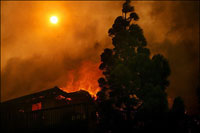US fires enlarge number of evacuees to 270,000
At least 270,000 people had to leave their homes, driven away by the wildfires in Southern California. More than 700 homes are burnt, 245,957 acres ablaze, and it may be only the start of the destruction for the state.

The blazes bedeviled firefighters as walls of flame whipped from mountain passes to the edges of the state's celebrated coastline, spreading so quickly that even hotels serving as temporary shelters for evacuees had to be evacuated.
Wanda Tomkinson, 79, fled the Doubletree hotel in Del Mar with her husband and their Boston Terrier after employees called each room to tell customers they had to leave. The couple, carrying medication, clothes, tax records and a dog bowl, said they were relying on a family friend to take them in.
If not, Tomkinson added, "the Lord'll take care of us."
As the fires spread, most out of control, smaller blazes were merging into larger, more fearsome ones. Evacuations were being announced in one community after another as firefighters found themselves overwhelmed by gale-force Santa Ana winds, some gusting to 70 mph (113 kph).
As dawn broke, authorities issued a new round of mandatory evacuations for about 5,600 homes in parts of San Diego County. State officials warned that the total estimate of evacuees in the region could rise, because officials were still working to determine how many people had fled.
At Marine Corps Air Station Miramar, about 40 aircraft that included F-18 fighter jets, C-130 cargo planes and Marine helicopters were evacuated to other bases in California and Arizona.
President George W. Bush declared a federal emergency for seven counties, a move that will speed disaster-relief efforts. The wildfires claimed one life, in San Diego County, and injured 42. At least 16 of the injured were firefighters.
Fire crews and fleeing residents described desperate conditions that were sure to get worse. Temperatures across Southern California were above average and were expected to approach 100 degrees (37.8 Celsius) Tuesday in Orange and San Diego counties.
The fires were exploding and shooting embers in all directions, preventing crews from forming traditional fire lines and severely limiting aerial bombardment.
"Lifesaving is our priority. Getting people out from in front of the fire _ those have been our priorities," said Capt. Don Camp, a spokesman for the California Department of Forestry and Fire Protection.
Thousands of residents sought shelter at fairgrounds, schools and community centers. The largest gathering was at Qualcomm Stadium in San Diego, where evacuees anxiously watched the stadium's television sets, hoping for a glimpse of their neighborhood on the local news.
San Diego County was ablaze from its rural north to its border region with Mexico, where the wildfires that started Sunday claimed their only fatality to date: a 52 year-old man from Tecate, a town on the U.S. side of the border southeast of San Diego. His body was found Sunday afternoon, the San Diego County Medical Examiner's Office said, although no other details were released.
At least 250,000 in San Diego alone were told to leave. Public schools were closed, as were campuses at the University of California, San Diego and San Diego State University.
In the northern part of the county, 500 homes and 100 businesses had been destroyed as a wildfire exploded to 145,000 acres (58,680 hectares) and marched toward the Pacific Coast enclave of Del Mar, forcing a partial evacuation.
The scope of the infernos was immense and was reminiscent of the blazes that tore through Southern California four years ago this month, killing 22 and destroying 3,640 homes.
The fires have been made worse by fierce Santa Ana winds. The winds which sweep through Southern California's canyons in fall and winter are stronger than normal, turning already parched scrubland into tinder.
Homes have burned from the beaches of Malibu to the mountain retreats east of Los Angeles and south through Orange and San Diego counties to Mexico.
East of Los Angeles, a two-front fire destroyed at least 160 homes in the Lake Arrowhead area, the same mountain resort community where hundreds of homes were lost four years earlier.
One of the blazes, near Green Valley Lake, was so intense that firefighters were forced to pull back.
Touring an evacuee camp at Qualcomm Stadium in San Diego, Gov. Arnold Schwarzenegger pledged to do everything in his power to assist the firefighting effort and help those who have lost their homes.
"I will be relentless all the way through this," Schwarzenegger said.
Subscribe to Pravda.Ru Telegram channel, Facebook, RSS!


